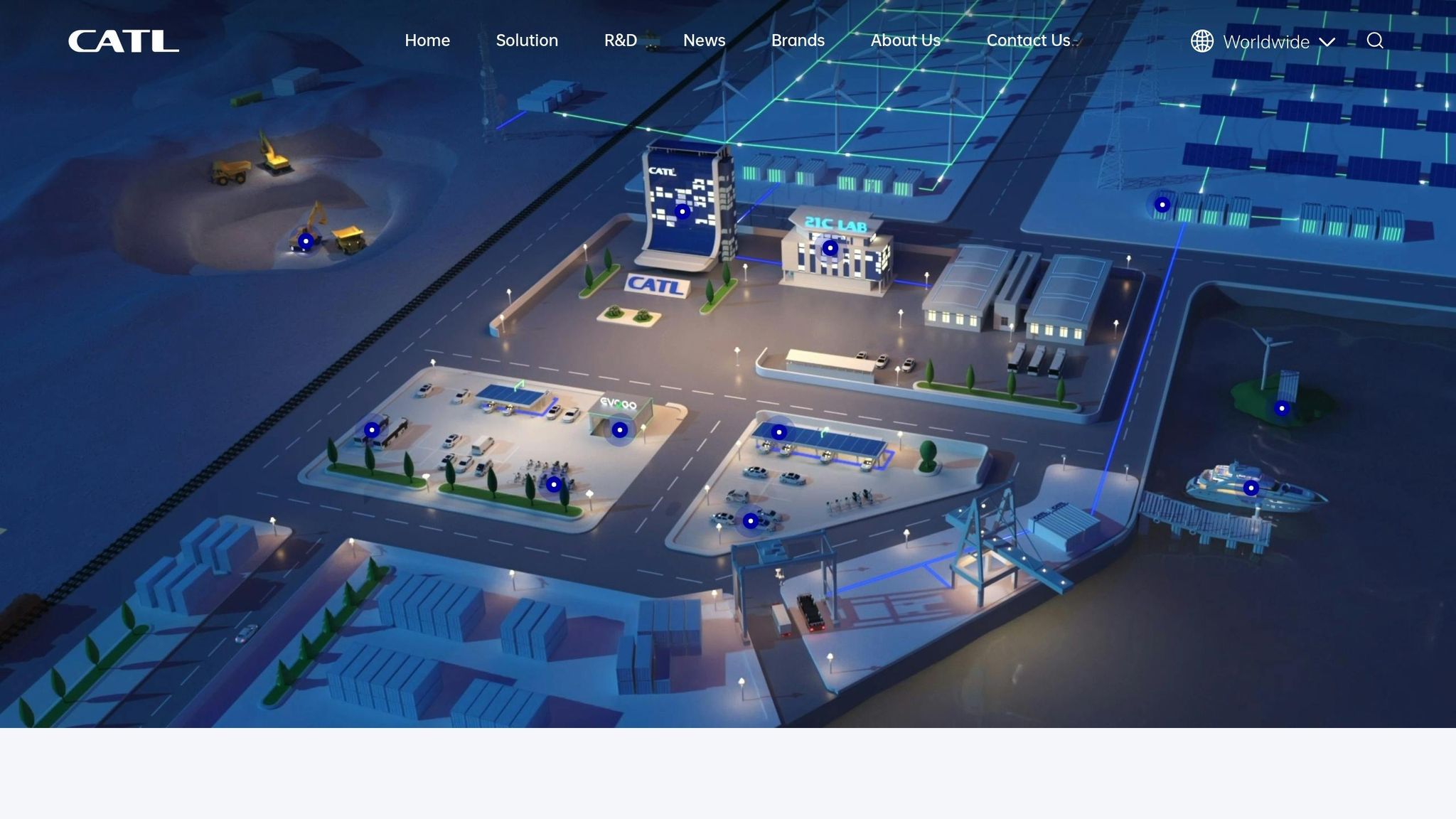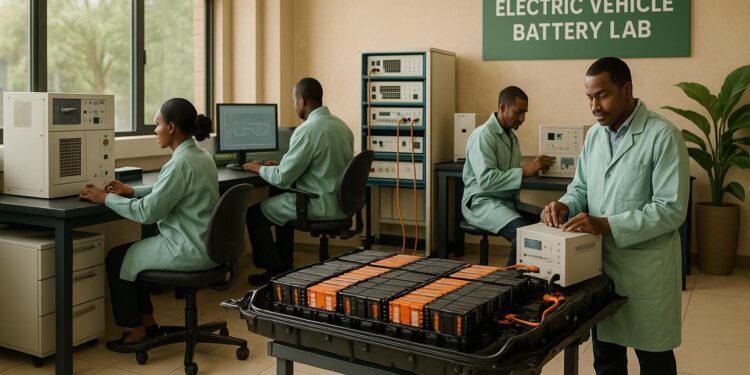Kenya has launched East Africa’s first electric vehicle (EV) battery lab in Nairobi, a move that strengthens its position in the region’s growing EV market. This facility addresses key challenges by offering local battery testing, analysis, and reconditioning services, which were previously outsourced abroad. With over 350 registered EVs and rising adoption rates, the lab supports Kenya’s push for clean energy and sustainable transportation.
Key Highlights:
- Services Offered: Testing and development of various battery types (e.g., Lithium-ion, Nickel Manganese Cobalt, Sodium-Ion) for vehicles like e-bikes and buses.
- Government Support: Investments in EV charging stations and policies requiring EV-friendly infrastructure.
- Local Benefits: Boosts EV manufacturing, reduces costs, and ensures compatibility with Kenya’s unique conditions.
- Challenges: High upfront costs, limited charging infrastructure outside cities, and battery recycling concerns.
This lab positions Kenya as a leader in EV technology in East Africa, addressing local needs while driving innovation in the region.
Africa’s EV Game-Changer: Kenya Partners with China’s CATL

What the EV Battery Lab Does
The new EV battery lab in Nairobi focuses on testing and advancing various electric vehicle (EV) battery technologies. Its purpose is to fill critical gaps in Kenya’s EV ecosystem by offering local testing solutions for different battery types.
Battery Testing and Development
The lab evaluates a wide range of batteries, including the widely used Lithium-ion batteries found in most modern EVs. It also works with Nickel Manganese Cobalt (NMC) variants, known for their high energy density and reliable performance. Beyond these, the lab tests Sodium-Ion, Solid State, Fuel Cell, Molten Salt, and Flow batteries, analyzing their chemical, electrical, mechanical, and thermal characteristics to keep pace with global advancements. This thorough testing ensures the lab can support both locally manufactured and imported EV applications.
Support for Local and Imported EVs
Kenya’s transportation sector is evolving, and the lab plays a key role by testing complete battery packs for a variety of vehicles, such as e-bikes, hoverboards, and other micro-mobility devices. This helps ensure these technologies meet the needs of the local market while aligning with international standards.
Impact on Kenya’s EV Market and Environmental Goals
Kenya’s new EV battery lab is a major step forward in the country’s push toward clean transportation. By enabling local battery testing, the facility not only aligns with Kenya’s environmental ambitions but also helps build a foundation for the growth of its electric vehicle (EV) market. These advancements complement government efforts to create a supportive policy environment.
Reducing Emissions
The lab focuses on testing and refining battery performance throughout their lifecycle. This ensures that EV batteries operate efficiently, which directly enhances the performance of electric vehicles. As a result, EVs can significantly reduce emissions, contributing to Kenya’s environmental objectives. Better battery efficiency also strengthens the effectiveness of fiscal measures and regulatory initiatives designed to support cleaner transportation.
Government Policies and Incentives
Kenya has introduced tax incentives to encourage EV adoption, and the Electric Mobility Association of Kenya (EMAK) has put forward proposals for additional fiscal measures to speed up the transition to electric mobility and support local industry growth. Meanwhile, a draft National E-Mobility Policy is under review, aiming to solidify government backing and set clear targets for EV deployment. The lab’s ability to meet technical standards plays a key role in supporting these policies and fostering a thriving EV ecosystem.
sbb-itb-e5ed0ed
Local EV Manufacturing and Charging Infrastructure Growth
Kenya is making significant strides in the electric vehicle (EV) sector with the introduction of a new EV battery lab. This move is part of a broader initiative to boost local EV manufacturing and expand the country’s charging infrastructure. The lab’s cutting-edge battery testing capabilities are expected to play a key role in advancing domestic EV production and the development of robust charging networks. Together, these efforts are reshaping Kenya’s EV landscape and setting a strong foundation for future growth.
New EV Assembly Plants in Kenya
The battery lab’s launch aligns with the early growth of Kenya’s EV manufacturing sector. Local companies have begun assembling electric vehicles, focusing on electric motorcycles and buses. These early ventures highlight a growing capacity for domestic assembly. The lab enhances this process by allowing manufacturers to test battery performance under Kenya’s unique climate conditions, cutting down on the need for overseas testing. This not only speeds up development but also supports the expansion of the country’s EV assembly capabilities, creating a natural synergy with the growing charging infrastructure.
Expanding EV Charging Networks
Kenya’s charging network has seen impressive growth recently, with utility companies and private partnerships working to establish charging stations along highways and in urban areas. The battery lab contributes to this progress by testing how batteries respond to different charging protocols, ensuring that a wide range of EVs can seamlessly use the infrastructure. This focus on compatibility strengthens the foundation for a more accessible and reliable charging network.
Kenya vs Other African EV Markets
While many African nations are exploring EV production with an export-oriented focus, Kenya is addressing local challenges head-on. By integrating battery testing with manufacturing, Kenya has adopted a unique approach that prioritizes domestic needs. The establishment of the battery lab is a pivotal step in this strategy, positioning Kenya as a leader in the African EV market. These developments highlight the country’s potential to become a regional hub for electric mobility, setting it apart from other markets on the continent.
Future Prospects: Opportunities and Obstacles
The EV battery lab marks a major step forward for Kenya’s electric vehicle (EV) sector. It opens doors for investment and research while drawing attention to the challenges that need to be addressed to speed up EV adoption. This facility has the potential to establish Kenya as a key player in EV technology across the region.
Attracting Investment and Research
The lab’s advanced testing services are already drawing interest from investors in Kenya’s green technology space. By offering specialized battery testing, it tackles some of the barriers to EV adoption, making the market more appealing to both local and international investors. Kenya’s Energy Transition and Investment Plan supports this momentum, with significant investments in the power and transport sectors aimed at achieving Net Zero emissions by 2050. As Africa’s first EV battery testing facility, the lab not only reinforces Kenya’s pioneering status but also enhances its attractiveness to research partners. With the growing demand for these services, investment in the sector is expected to rise. However, despite these promising developments, the EV industry still faces several challenges.
Challenges to EV Adoption
While the potential is clear, Kenya’s EV transition is not without obstacles. High upfront costs and expensive battery replacements – up to $3,700 every 8–10 years – make EVs less appealing to many consumers, even with the promise of long-term savings. Outside major cities, limited charging infrastructure creates range anxiety, especially for long-distance travel. Additionally, a lack of skilled technicians and access to spare parts complicates maintenance. On top of this, unclear regulations for battery recycling pose environmental and logistical challenges. A rapid increase in EV adoption could also put significant pressure on the national power grid if charging demands aren’t managed effectively. Addressing these issues is essential for Kenya to make the most of its leadership in this field.
Kenya’s Regional Leadership Role
With its cutting-edge battery lab, Kenya has a unique opportunity to lead the way in regional EV innovation. The facility could become a hub for collaboration and knowledge-sharing in battery technology and testing. By fostering partnerships and engaging consumers, Kenya can solidify its position as a leader in the EV space across the region.
Key Points Summary
Kenya has established its first EV battery lab in Nairobi, addressing critical needs in battery testing, development, and technical expertise. This initiative is set to play a major role in boosting the regional EV industry and supporting clean energy goals.
Through its training and research programs, the lab is building a skilled workforce to meet the demands of the growing EV sector. By focusing on developing local talent, it strengthens Kenya’s position within the EV ecosystem.
The lab also contributes to environmental goals by improving battery technology and tackling battery waste, aligning with Kenya’s commitment to clean energy solutions.
Additionally, the lab is drawing investment and research opportunities, which are speeding up local EV manufacturing and the development of charging infrastructure. This comprehensive approach addresses key challenges to EV adoption in the region.
FAQs
What advantages does Kenya’s new EV battery lab bring to local manufacturers and consumers?
Kenya’s new EV battery lab brings important advantages to both manufacturers and consumers. For local manufacturers, it provides a space to test and develop EV batteries domestically. This reduces dependence on imported parts and helps cut production costs, potentially making electric vehicles and their components more affordable for the local market.
For consumers, the lab fuels the growth of Kenya’s EV industry by encouraging innovation, generating jobs, and increasing the availability of locally produced EV products and services. It also supports the shift toward cleaner transportation, helping make electric vehicles more accessible, dependable, and environmentally friendly for daily use.
How will the new EV battery lab in Nairobi help Kenya achieve its clean energy and sustainability goals?
The newly established EV battery lab in Nairobi marks a significant milestone for Kenya’s push toward clean energy and greener transportation. This facility focuses on developing and testing electric vehicle batteries, paving the way for eco-friendly transit options and lessening the country’s dependence on fossil fuels. By nurturing local talent and expertise in battery technology, the lab is creating solutions specifically designed to meet Kenya’s unique needs, all while supporting the growth of sustainable urban infrastructure.
On top of that, the lab plays a key role in tackling urban pollution by advancing methods for better battery management and recycling. This effort ties into Kenya’s broader vision of a greener, cleaner future, ensuring a healthier environment for its citizens.
What obstacles does Kenya face in growing its EV infrastructure, and what steps is the government taking to overcome them?
Kenya is grappling with several hurdles as it works to grow its electric vehicle (EV) infrastructure. Among the biggest roadblocks are the limited availability of public charging stations, steep electricity prices, and the uneven development of infrastructure between urban hubs and rural regions. These challenges make it tough to ensure that EV technology reaches everyone across the country.
To tackle these issues, the Kenyan government has rolled out several initiatives. Tax incentives have been introduced to make EVs more affordable, alongside policies targeting a 5% EV adoption rate by 2025. Efforts are also being made to expand the charging network, reduce import costs for EVs and their components, and enhance rural electrification. Together, these steps aim to build a more accessible and sustainable EV ecosystem for all Kenyans.
Related posts
- Guide to Electric Vehicle Charging Stations in Kenya
- Electric Cars in Kenya: Which Ones Are Available Right Now ⚡️
- EV Charging Stations in Nairobi: Where and How to Recharge
- Kenya’s EV Future: Is Now the Right Time to Switch?




